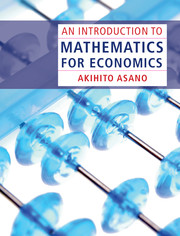Book contents
- Frontmatter
- Contents
- List of illustrations
- List of tables
- Preface
- Acknowledgements
- 1 Demand and supply in competitive markets
- 2 Basic mathematics
- 3 Financial mathematics
- 4 Differential calculus 1
- 5 Differential calculus 2
- 6 Multivariate calculus
- 7 Integral calculus
- Appendix A Matrix algebra
- Appendix B An introduction to difference and differential equations
- Index
7 - Integral calculus
Published online by Cambridge University Press: 05 December 2012
- Frontmatter
- Contents
- List of illustrations
- List of tables
- Preface
- Acknowledgements
- 1 Demand and supply in competitive markets
- 2 Basic mathematics
- 3 Financial mathematics
- 4 Differential calculus 1
- 5 Differential calculus 2
- 6 Multivariate calculus
- 7 Integral calculus
- Appendix A Matrix algebra
- Appendix B An introduction to difference and differential equations
- Index
Summary
Our main aim in this chapter is to study the welfare effects of taxation. The government levies tax on various goods, and we would like to evaluate how our well-being might be affected by the taxation. To this end, we ought to discuss a notions called consumer surplus and producer surplus. They measure consumers' and producers' well-being in terms of dollars.
As will become clear in the following sections, measuring consumer surplus or producer surplus involves calculating the area in between the demand and supply schedules. As long as both curves are linear, there is no problem because we all know how to calculate the area of a triangle. However, if one (or both) of the demand and supply schedules is (are) non-linear, we need to introduce a certain mathematical technique that allows us to calculate the area in question. This technique is called integral calculus. We begin by studying this technique in the following two sections, which will be followed by its application to finance where I introduce more elaborate techniques called integration by substitution and integration by parts.
We then discuss the demand and supply analysis from a different point of view. More specifically, we will give a different interpretation to the demand and supply schedules we discussed in Chapter 1. It will be the basis of explaining the notion of surplus. We will also study how to aggregate an individual demand (supply) schedules to obtain the market demand (supply, respectively) schedule.
- Type
- Chapter
- Information
- An Introduction to Mathematics for Economics , pp. 184 - 217Publisher: Cambridge University PressPrint publication year: 2012



